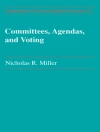The National Institute of Allergy and Infectious Diseases (NIAID) gives the highest priority to developing countermeasures against bioterrorism agents that are highly infective when dispersed in aerosol form. Developing drugs to prevent or treat illnesses caused by bioterrorism agents requires testing their effectiveness in animals since human clinical trials would be unethical. At the request of NIAID, the National Academies conducted a study to examine how such testing could be improved. Overcoming Challenges to Develop Countermeasures Against Aerosolized Bioterrorism Agents provides recommendations to researchers on selecting the kinds of animal models, aerosol generators, and bioterrorism agent doses that would produce conditions that most closely mimic the disease process in humans. It also urges researchers to fully document experimental parameters in the literature so that studies can be reproduced and compared. The book recommends that all unclassified data on bioterrorism agent studiesincluding unclassified, unpublished data from U.S. Army Medical Research Institute of Infectious Diseases (USAMRIID)be published in the open literature. The book also calls on the U.S. Food and Drug Administration to improve the process by which bioterrorism countermeasures are approved based on the results of animal studies.
Board on Life Sciences & Committee on Animal Models for Testing Interventions Against Aerosolized Bioterrorism Agents
Overcoming Challenges to Develop Countermeasures Against Aerosolized Bioterrorism Agents [PDF ebook]
Appropriate Use of Animal Models
Overcoming Challenges to Develop Countermeasures Against Aerosolized Bioterrorism Agents [PDF ebook]
Appropriate Use of Animal Models
购买此电子书可免费获赠一本!
语言 英语 ● 格式 PDF ● 网页 87 ● ISBN 9780309660938 ● 出版者 National Academies Press ● 发布时间 2006 ● 下载 3 时 ● 货币 EUR ● ID 7148018 ● 复制保护 Adobe DRM
需要具备DRM功能的电子书阅读器












